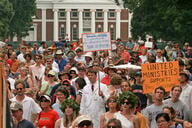You have /5 articles left.
Sign up for a free account or log in.
I have a terrible admission to make: I don’t particularly like listening to podcasts. Growing up, we never listened to talk radio (or morning talk TV). Our house (and our car rides) were filled with music stations, mix tapes and (in a pinch) comedy records, the closest thing to listening to talk radio we would ever get. I’ve carried that bias into adulthood, eschewing podcasts for the longest time, in part because I just associated it with mundane talk radio, but also because I can’t work while listening to a podcast.
Now, making podcasts, on the other hand …
Look, if you’ve been reading me in this space and the various other places I’ve been writing over the years, you know I have all the words. And there is only one thing I love more than writing all the words -- speaking all the words. I’ve had a number of opportunities to guest on a couple of podcasts over the years, and they were always enjoyable experiences, and I think I came off OK -- if a little loud -- causing the host to have to adjust my sound levels in postproduction. I mean, come on, what academic doesn’t want to answer questions for 30 to 60 minutes on topics that they are experts in?
Which leads to the next, somewhat natural question for someone in academia: Can and should we consider some podcasts academic output, being that we are speaking about our expertise, based on our experience, research and academic training? It feels in a lot of ways a rehashing of the Great Academic Blog debates of a (gulp) decade or so ago, but we seem to have learned from the experience.
Case in point is Hannah McGregor’s podcast, “Secret Feminist Agenda.” McGregor is an assistant professor in publishing at Simon Fraser University (Canada). In collaboration with Siobhan McMenemy, senior editor at Wilfred Laurier Press, McGregor developed a model for open peer review of scholarly podcasts. I would strongly encourage you to read through the process, the feedback and McGregor’s own reflections on the process. But ultimately, we’re starting to respond, in real time (relative to the slow ways academia usually moves), to new forms of scholarship.
But, for me, the most attractive part of podcasting is the feeling of community, that feelings that once existed around blogs and blogging. I got on social media and started blogging after I had moved to rural Kentucky as a mother with young children, and I was looking for community, for peers, for friends. I found all of those things on Twitter and through my blog. It is probably no coincidence that as blogging has receded (and, it seems, we all started writing books instead) that many of us looked to podcasting, both listening to and creating them. It is where I’ve found my friends again, but also where I’ve found to best find and promote our collective work.
That search for community and reach for our work is part of the reason why we started the “Closing Tabs” podcast at DTLT, and while we only managed to produce five episodes, the community we were able to create around the making and sharing of the podcast stayed with me. My favorite story was when we got Mike Caulfield to record an episode almost spontaneously; I saw him go on a rant on Twitter about information literacy, and I wanted to capture that perspective for a larger audience. He happened to have a free hour to talk, I set up a Zoom session and we captured a fantastic episode that remains relevant.
It was also why I wanted to start a podcast with my colleague Aimée Morrison around our ADHD diagnoses, “All the Things ADHD.” Hyperspecialized, maybe, but it represented an opportunity to thoughtfully, critically, but also playfully engage with each other and the larger ADHD community as we work through our relatively recent discoveries about ourselves. I love having a reason to come together to talk, but also being able to share that discussion with a larger community, as well as our friends and family.
And now it feels like I’ve come back full circle with co-hosting duties for “The View From Venus” podcast. My first big break as a blogger was when I answered a call for contributors and poured my heart out into this piece, which Mary graciously helped me edit and then publish. And, consider myself proven wrong, in the long run, that although still at the edges of the academy, the work we did on the blogs, the work we’re doing now with podcasting, is meaningful. Both personally and professionally, I benefited from blogging, and now I’m benefiting from podcasting.
I’m excited to see where it is going, but also to think about what’s next.








